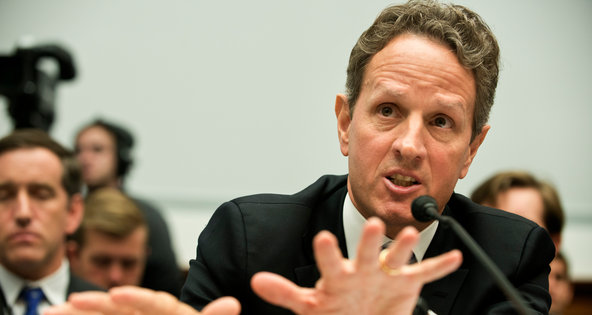 Brendan Smialowski/Agence France-Presse — Getty ImagesTimothy F. Geithner, the Treasury secretary, answered questions from lawmakers on Wednesday.
Brendan Smialowski/Agence France-Presse — Getty ImagesTimothy F. Geithner, the Treasury secretary, answered questions from lawmakers on Wednesday.
Timothy F. Geithner was grilled on Wednesday about the growing interest rate rigging scandal, as lawmakers questioned why he failed to thwart the illegal activity during the financial crisis.
As head of the Federal Reserve Bank of New York in 2008, Mr. Geithner learned that big banks were trying to manipulate a benchmark interest rate. Rather than curbing the bad behavior at specific firms, Mr. Geithner pushed broad reforms to the rate, known as the London interbank offered rate, or Libor.
“It appears you treated it as a curiosity, or something akin to jaywalking, as opposed to highway robbery,” Jeb Hensarling, Republican of Texas, said at a House hearing on Wednesday.
Related Links
- Europe Aims to Make Rate Manipulation a Criminal Offense
- Head of Barclays’ Compensation Committee Resigns
- New York Fed Faces Questions Over Policing Wall St. (July 24, 2012)
 Timeline: Libor and the Financial Crisis
Timeline: Libor and the Financial Crisis
Even as Republicans slammed Mr. Geithner on Wednesday, many Democrats came to his defense. Mr. Geithner, now the Treasury secretary, challenged the Republican critique as well. In testimony before the House Financial Services Committee, Mr. Geithner said he was “very concerned” that the rate-setting process lacked integrity and he promptly notified other regulators about his worries.
Last month, Barclays struck a $450 million settlement with American and British authorities over accusations that it undermined Libor. The case against the British bank was the first action to stem from a global investigation into more than 10 other banks.
Libor Explained
“We took the initiative to bring those concerns to the broader regulatory community,” Mr. Geithner said, referring to the Commodity Futures Trading Commission and Securities and Exchange Commission. “I believe we did the necessary and appropriate thing very early in the process,” he said.
But Mr. Geithner on Wednesday also acknowledged that he did not alert federal prosecutors to the wrongdoing.
The revelation prompted lawmakers to question whether his response was sufficient, given the scope of wrongdoing and the importance of Libor to the broader financial system. Libor, a measure of how much banks charge to lend to one another, is a benchmark for trillions of dollars in mortgages and other loans.
In April 2008, the New York Fed learned from Barclays that it was artificially depressing its Libor reports to deflect concerns about its health. “We know that we’re not posting um, an honest” rate, a Barclays employee told a New York Fed official in April 2008.
Mr. Geithner said he was not aware at the time of “that specific conversation.”
But that same day, New York Fed officials wrote in a weekly internal memo that the problem was widespread. “Our contacts at Libor contributing banks have indicated a tendency to underreport actual borrowing costs,” New York Fed officials wrote, “to limit the potential for speculation about the institutions’ liquidity problems.” At the time, high borrowing costs were a sign of poor health.
Even after discovering that banks were manipulating Libor, the New York Fed pursued a somewhat passive approach.
When Mr. Geithner briefed other American regulators on Libor in May 2008, he did not disclose the specific wrongdoing at Barclays. Republicans pressed him on Wednesday to explain why he didn’t notify the Justice Department about the illegal behavior.
He explained that the Justice Department did not belong to the working group of regulators that were focused on Libor.
Mr. Geithner, who outlined the state of Wall Street regulation on Wednesday, heralded his past efforts to reform Libor. He noted that the New York Fed repeatedly pushed a British trade group that oversees Libor to overhaul the rate-setting process.
In a June 2008 e-mail to the Bank of England, the country’s central bank, Mr. Geithner recommended that British officials “strengthen governance and establish a credible reporting procedure” and “eliminate incentive to misreport” Libor.
The New York Fed then advocated fixes more forcefully than its British counterparts, records show. The trade group later adopted only some of Mr. Geithner’s recommendations.
“We gave them very specific detailed changes,” Mr. Geithner said, adding that “if more of those would have been adopted sooner, you would have limited the risk.”
But Representative Randy Neugebauer, Republican of Texas, questioned why the New York Fed focused on policy solutions rather than the bright-line legal violations.
“If they were having structural problems, then I think your e-mail was appropriate,” said Mr. Neugebauer, who is leading a Congressional investigation into how the New York Fed handled the Libor scandal. “But what was being disclosed here was fraud.”
Ultimately, Mr. Geithner said, responsibility rests with the British regulators. “We felt, and I still believe this, it was really going to be on them to fix this. This is a rate set in London.”
Democrats echoed his argument. “I for one am not part of the ‘blame America first’ crowd,” said Representative Brad Sherman, Democrat of California.
In deferring to overseas authorities, Mr. Geithner drew further ire from Republicans. “It wasn’t just a British problem,” Mr. Neugebauer said, noting that the rate affects the cost of borrowing around the world.
Despite the scrutiny, Mr. Geithner escaped relatively unscathed. While Republicans rebuked his approach to the Libor problems, few new revelations emerged from the more than two-hour hearing. And the pressure eased at times when Democratic lawmakers praised Mr. Geithner for championing reforms to Libor.
“There’s been an effort to blame you for all of this,” said Barney Frank, the ranking Democrat on the committee. But “you reported this” to other regulators.
Mr. Frank, a Massachusetts Democrat, cast the blame not on regulators but the banks that ran afoul of the law. The banks, he said, “grievously misbehaved.”
Article source: http://dealbook.nytimes.com/2012/07/25/facing-congress-geithner-grilled-on-rate-rigging/?partner=rss&emc=rss